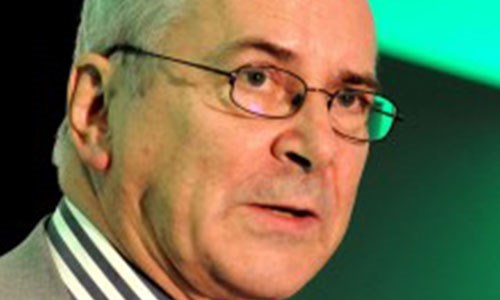News
Cardiff Business Club Event review: Sir Peter Hendy CBE, Chairman of Network Rail
Date Posted: 31 October 2016
Sir Peter is undoubtedly a transport enthusiast. As well as spending the best part of four decades immersed in the sector, he also owns a double-decker bus and has a freight train name in his honour.
His enthusiasm for the sector is matched in equal parts with his intrinsic knowledge and understanding of the impact the UK’s transportation system has on the economy - more specifically, the rail network. It is this point that formed the basis of his address to the Club.
“The railway is a complex environment,” he started off by saying. “We have lost collective sight of what the railway is actually for.
“It is for creating economic growth, creating jobs and booming housing. Transport is the means by which you achieve these things and the railway is a key feature of this.”
Its overriding role, he asserts, is “to create economic wealth.”
Despite rapid advancements in technology over the last 20 years or so, Sir Peter remains steadfast in his resolution that technology will not stifle travel – if anything it has been shown to increase it.
He uses the example of his wife, whose HR consultancy benefitted greatly from technology. As her business continued to expand beyond her local area and across the UK, so did the increased need to travel to meet with these clients.
Technology and transport should not be seen as being in competition with one another; rather, they are complimentary of each other. As Sir Peter puts it: “There is no scenario whereby economic growth can be achieved without the need for travel.”
Investment in the rail network has consistently remained at 4% per annum each year for the last 10 years, which is good news given the increased demands facing it. Indeed, passenger journey’s have doubled over the last 20 years and there is no sign of them slowing down.
“It is essential that we work with all stakeholders to effectively plan for its future,” he said. But “the challenge we face now is that we have a rail system befitting 1980s demand yet incapable of managing the demand we anticipate in the future.”
Investment, he argued, is critical to the network’s long-term ability to manage capacity. However, the Treasury cap that came into play when Network Rail returned to public ownership in 2014 has seen the organisation trying to meet the dual challenge of needing to finance modernisation but with significantly less finance available.
Sir Peter said: “An unlimited capacity to borrow [as was the case prior to 2014] and an unlimited capacity to spend was a luxury.” Today, “we’re investing more in the UKs rail infrastructure than at any time since Brunel’s day.
The volume of work and money being spent is significant not just in the scale of the projects being undertaken, but also the impact they will have on how the railway of the future will run.”
He added: “It’s a painful process that has to be done to ensure we have a railway that is fit for twenty-first century needs,” said Sir Peter.
Sadly though, “the only coal travelling through the Severn Tunnel is coming into Wales rather than out of it.”
As for Cardiff Central, Sir Peter echoed a widely held sentiment that a solution needs to be found. It is, as he said, at “full capacity and has to become fit for the next 20 years, not reflective of the last 50.”
Network Rail, said Sir Peter, is a step closer to taking control of Cardiff Central station. “Investment,” he said, “is crucial and its impact will have a far-reaching impact on the City Region and the wider Welsh economy.”
Turning to the question of whether the mainline electrification project will be extended beyond the Welsh capital to Swansea, there remains some uncertainty. Sir Peter said: “There has to be an agreement between the UK and Welsh governments and until then it is not possible to say whether this will take place.”
If it happens, it certainly won’t fall within the current five-year spending plan (CP5). But if an agreement is made then there is the possibility that the money could be made available in the next funding cycle (CP6, which runs from 2019-2024).
He added: “We have to work with the Welsh and UK governments to persuade them that this [expanding electrification to Swansea] is right thing to do - not just because we think the railway needs it, but as a way of creating economic benefits.”
Sir Peter is keen to promote the rail industry as an employer of choice. Addressing the London Assembly Transport Committee last month, Sir Peter stated that the sector has been slower than others in attracting a diverse workforce “because we fail to communicate that we are an industry of growth.”
At that meeting he suggested that the sector often fails to get the positive media coverage it deserves, with their interest seemingly only raised when things go wrong. “Nor are we a load of old dull blokes in the corner – we are a central part of the way this nation lives and function.
Speaking to the Club’s members, he said: “If you are prepared to learn and work in different places, the rail industry offers you a job for life. This is quite extraordinary and most sectors cannot make such a claim, but we can.”
Britain’s engineering pedigree remains strong on a global stage, says Sir Peter. “I hope we can inspire a new generation of people with the technical knowledge to work on the many truly fascinating and increasingly complex rail engineering projects that are taking place now and those earmarked for the future.”
“To have an industry that cannot replace its lost talent is frankly disgraceful. We have jobs for people for the whole of their career.”
